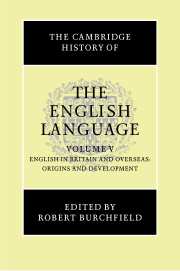Book contents
- Frontmatter
- 1 Introduction
- PART I Regional varieties of English in Great Britain and Ireland
- PART II English overseas
- 6 ENGLISH IN AUSTRALIA
- 7 ENGLISH IN THE CARIBBEAN
- 8 ENGLISH IN NEW ZEALAND
- 9 ENGLISH IN SOUTH AFRICA
- 10 ENGLISH IN SOUTH ASIA
- Glossary of linguistic terms
- Bibliography
- Index
- THE CAMBRIDGE HISTORY OF THE ENGLISH LANGUAGE
- Map 7.1 Movements of English/Creole speakers in the seventeenth century
- Map 7.2 Movements of English/Creole speakers after 1700
- References
9 - ENGLISH IN SOUTH AFRICA
from PART II - English overseas
Published online by Cambridge University Press: 28 March 2008
- Frontmatter
- 1 Introduction
- PART I Regional varieties of English in Great Britain and Ireland
- PART II English overseas
- 6 ENGLISH IN AUSTRALIA
- 7 ENGLISH IN THE CARIBBEAN
- 8 ENGLISH IN NEW ZEALAND
- 9 ENGLISH IN SOUTH AFRICA
- 10 ENGLISH IN SOUTH ASIA
- Glossary of linguistic terms
- Bibliography
- Index
- THE CAMBRIDGE HISTORY OF THE ENGLISH LANGUAGE
- Map 7.1 Movements of English/Creole speakers in the seventeenth century
- Map 7.2 Movements of English/Creole speakers after 1700
- References
Summary
Introduction
The sociohistorical context of English in South Africa differs in important ways from those of English in Australia and New Zealand. There are similarities, for instance that all three originated in the English of emigrant communities speaking several different dialects; but there are major differences too.
From 1795 onwards, the first British soldiers and later settlers at the Cape moved into a long-established ‘white’ community with its own language and its own powerful traditions and dynamics. Beyond this ‘white’ community – the ‘Cape Dutch’ – and indeed merging into it, were the original occupants of the subcontinent: the Khoisan peoples who had already lost their ancestral lands in the south to the Dutch and beyond them the black nations whose lands and destinies were to fall under white control during the next century. English thus moved into an already established symbiosis of languages and communities.
The South African Dutch culture of the eighteenth century flowered in the Trekker republics of the nineteenth and became the dominating Afrikanerdom of the twentieth. Much that is characteristic of South African English can be traced to the language and culture of the South African Dutch and their descendants, though there is of course a basic distinction between ‘Afrikaans English’ (a second language), and South African English (hereafter SAfrE), a mother tongue.
Keywords
- Type
- Chapter
- Information
- The Cambridge History of the English Language , pp. 430 - 496Publisher: Cambridge University PressPrint publication year: 1994
References
- 16
- Cited by

